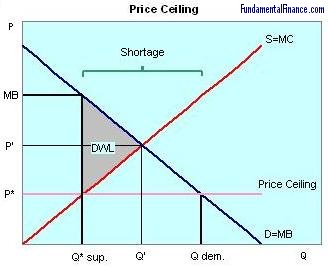A price ceiling is a maximum amount mandated by law that a seller can charge for a product or service.
A price floor set below the free market equilibrium.
C it will increase the number of jobs available in the labor market.
B it will create a deadweight loss.
Price floor is enforced with an only intention of assisting producers.
In this case the floor has no practical effect.
However a price floor set at pf holds the price above e 0 and prevents it from falling.
If a price floor is set above the free market equilibrium price as shown where the supply and demand curves intersect the result will be a surplus of the good in the market.
A price floor could be set below the free market equilibrium price.
The result of the price floor is that the quantity supplied qs exceeds the quantity demanded qd.
Economics microeconomics consumer and producer surplus market interventions and international trade market interventions and deadweight loss price ceilings and price floors how does quantity demanded react to artificial constraints on price.
Introduction to deadweight loss.
39 because minimum wage is a price floor a it will be set below the market equilibrium price.
Government set price floor when it believes that the producers are receiving unfair amount.
This graph shows a price floor at 3 00.
In the first graph at right the dashed green line represents a price floor set below the free market price.
It s generally applied to consumer staples.
Price floors and price ceilings often lead to unintended consequences.
Simply draw a straight horizontal line at the price floor level.
A price floor example.
If it s not above equilibrium then the market won t sell below equilibrium and the price floor will be irrelevant.
The intersection of demand d and supply s would be at the equilibrium point e 0.
Price floors prevent a price from falling below a certain level.
When a price floor is set above the equilibrium price quantity supplied will exceed quantity demanded and excess supply or surpluses will result.
Drawing a price floor is simple.
If price floor is less than market equilibrium price then it has no impact on the economy.
For a price floor to be effective it must be set above the equilibrium price.
However price floor has some adverse effects on the market.

